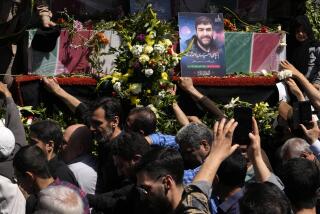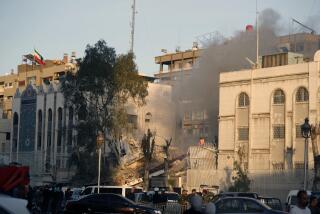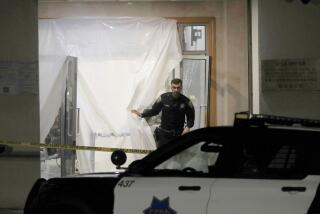CIA Punishes 7 in Airstrike on Embassy
- Share via
WASHINGTON — Eleven months after the CIA mistakenly sent U.S. warplanes to bomb the Chinese Embassy in Belgrade, the spy agency has fired one employee and sanctioned six others, including a senior official, in the first official punishment of those involved in the deadly incident.
The May 7 airstrike on the embassy, at the height of the NATO air campaign to force Yugoslav forces out of Kosovo, led to a near rupture of relations between Beijing and Washington. Talks between the United States and China on human rights and nonproliferation still have not resumed.
The State Department informed the Chinese Embassy in Washington on Saturday of the disciplinary actions by the CIA, which occurred Thursday and Friday.
The CIA declined to identify those who were disciplined for the bombing, which killed three Chinese civilians and wounded 27 others. But a U.S. official said the agent who was fired “was the one who selected the target . . . and essentially put the X on the map in the wrong place.”
George J. Tenet, director of the CIA, also sanctioned a senior CIA official and five other officers, four of whom are managers. The sanctions ranged from an oral warning to letters of reprimand that carry a one-year prohibition on promotions, financial bonuses and other awards.
In addition, Tenet requested that a career CIA officer at the National Imagery and Mapping Agency, the federal agency responsible for providing the military map used in the raid, receive an administrative warning.
A U.S. intelligence official, who asked not to be identified, denied that the punishment was relatively light considering the tragedy involved.
“I guarantee that the people who receive the letters [of reprimand] don’t take them lightly,” the official said.
No further disciplinary measures are expected at the CIA or any other U.S. government agency involved in the bombing, the official said.
The CIA had sought to target the Yugoslav Federal Directorate of Supply and Procurement headquarters. But intelligence analysts used outdated maps, and in a series of blunders, mapping experts then supplied coordinates for the Chinese embassy, which was several hundred yards away from the arms agency.
Tenet praised an unnamed mid-level CIA officer, saying he went “well beyond the call of duty” when he repeatedly questioned the targeting of the building. Officials said later, however, that his concerns were not heeded within the CIA or at the U.S. military’s European Command, which managed the U.S. role in the NATO airstrikes.
The CIA insisted in a statement Saturday, as it has since last May, that the bombing was a “tragic accident.” Beijing has rejected that explanation in the past, angrily insisting that the attack was deliberate.
“There is no indication that the Chinese Embassy was intentionally targeted or that anyone involved in proposing or reviewing the target nomination package was aware that the site was actually an embassy,” CIA spokesman Bill Harlow said Saturday night.
A Chinese Embassy spokesman, Yuan Zhang, declined comment other than to say that his government had demanded punishment of those responsible for the bombing. Beijing also had insisted that Washington formally apologize, pay compensation to the victims and their families, and conduct a complete investigation.
Asked if Beijing was satisfied with the CIA actions, he said, “We have to have time to study it and make a response.”
Robert Manning, director of Asia programs at the Council on Foreign Relations, said Beijing is suspicious of the CIA claims because the bombs reportedly “hit right in the center of the Chinese spy operation in Europe.”
“I think we could stand on our heads and I don’t think they will believe us,” he said.
Senior U.S. officials have repeatedly apologized for the bombing. Last August, Washington agreed to pay $4.5 million in compensation to the victims of the bombing and their families, and in December it agreed to pay China $28 million for damage to its embassy.
China, in turn, agreed to pay the United States $2.87 million for damage to U.S. property caused when tens of thousands of Chinese protesters rioted outside the U.S. Embassy in Beijing and in several other Chinese cities after the bombing.
Harlow said the internal investigation found that the CIA “lacked formal procedures for preparing and forwarding target nomination packages” to the U.S. military. He said the agency had since “taken several steps” to rectify “systemic organizational problems” but that the actions were classified.
The CIA is not usually involved in selecting targets during a military campaign. But the agency received a special request to help meet the constant demand for new bombing targets during NATO’s 11-week bombardment of Yugoslavia.
In this case, a CIA officer apparently got the correct address of the Yugoslav arms procurement agency from the Internet but then used the numbering of buildings on nearby streets to mistakenly identify a spot on the map in Belgrade.
He took that map to NIMA, which determined coordinates for the building. U.S. Air Force B-2 bombers accurately dropped three bombs onto those coordinates, but it turned out to be the Chinese Embassy. It had moved there in 1996, but U.S. maps and electronic databases used by the Pentagon still showed the mission in another part of Belgrade.
The correct address of the embassy was on tourist maps and in the Belgrade telephone book.
More to Read
Sign up for Essential California
The most important California stories and recommendations in your inbox every morning.
You may occasionally receive promotional content from the Los Angeles Times.














